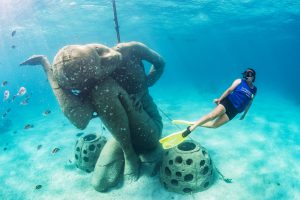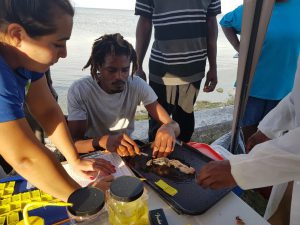The Explorer’s Club recently honored Natalie Miaoulis-Maillis for her work in fishery economics and sustainability, naming her one of the “Explorers Club 50: Fifty People Changing the World that the World Needs to Know About.”
Miaoulis-Maillis graduated with her Master of Science in Food and Resource Economics (FRE) from the University of Florida in 2020 and currently serves as a fisheries specialist for the Nature Conservancy’s northern Caribbean program.

Time in FRE
For her thesis, Miaoulis-Maillis looked at the viability of lionfish fisheries in the U.S. Virgin Islands.
“The most important part of my thesis was the on-the-ground research that went into it and learning firsthand from fishers what their needs were and how best to engage with stakeholders in the field,” Miaoulis-Maillis said. “My thesis research confirmed my passion for working with local communities to help ensure sustainable fisheries.”
While in the Master of Science with Thesis program at UF, Miaoulis worked with many FRE faculty.
“Dr. Sherry Larkin helped launch me into the world of fisheries and has been an inspiration to what women can achieve in the field personally and professionally,” Miaoulis-Maillis said. “I will never forget my first class with her and how intrigued I was and the constant support from her throughout my thesis. Also, Dr. Gilly Evans encouraged me to pursue my passions for a career that impacted my region, The Caribbean.”
Miaoulis-Maillis describes the Food and Resource Economics program as instrumental to her career development. She also cites her time as a member and officer of the Agricultural Economics Club and Gator NAMA, providing her with real-life skills to enable success in the workforce.
“I would not trade my degree from this department for any other for the practical, implementable skills learned,” Miaoulis-Maillis said.
Promoting Sustainable Ocean Economies
Growing up on the island of Abaco in the Bahamas, Miaoulis-Maillis has loved the ocean for as long as she can remember. However, working directly with fishers in the field in the U.S. Virgin Islands fueled her passion and motivation to continue working with fisheries in the region.

“My passion for looking for strategies to include local communities and resource users in the policymaking process fuels me. The connection between community and viable achievable sustainable fisheries and ocean policy is critical,” Miaoulis-Maillis said. “When communities are involved, it’s more likely to be successful implementation and sustainable outcomes, and this is what I strive to accomplish in my work.”
Currently, Miaoulis-Maillis works with the Nature Conservancy, an international non-profit focused on land protection. Seafood production is a significant part of the Bahamian economy. Miaoulis-Maillis’s work focuses on working with local producers to study different the production of different seafood species and put into place best practices and regulations for increased sustainability.
Since Miaoulis-Maillis joined the Nature Conservancy and began her work in the region, the Bahamas have received the International Marine Stewardship Council’s Certification for Sustainability for Spiny Lobster.
Her current project is with the Bahamas queen conch fishery, which generates over $7 million per year and helps to support thousands of households throughout the country. It includes working with fishers to conduct conch maturity sampling, weighing and measuring, studying reproductive tissue, and recording data.
She stresses the importance of including local communities in the entire process. By having local producers in the process and learning from their daily firsthand experiences, support is strengthened for further research and policy creation.
“I look forward to a future where scientists, policymakers, and local communities are a unified body working to ensure sustainability,” Miaoulis-Maillis said.
Joining the ECO 50
Created by the Explorer’s Club just a few years ago in 2020, Miaoulis is part of the second class of inductees into the ECO50.
Members include explorers and scientists from various fields of expertise and over 20 different countries.
“There are many people out there working very hard for ocean and fisheries sustainability,” Miaoulis-Maillis said. “I am one, one might say, of many fish in the sea that’s working towards this, but it is an honor for the work to be recognized, most importantly to give a stage and platform for the great work that is happening within the Caribbean region. The Caribbean is more than palm trees, sand, and sea but also a beautiful diaspora of peoples that are dependent on the ocean resources for a living and cultural way of life, and I am honored to represent them.”
 0
0
